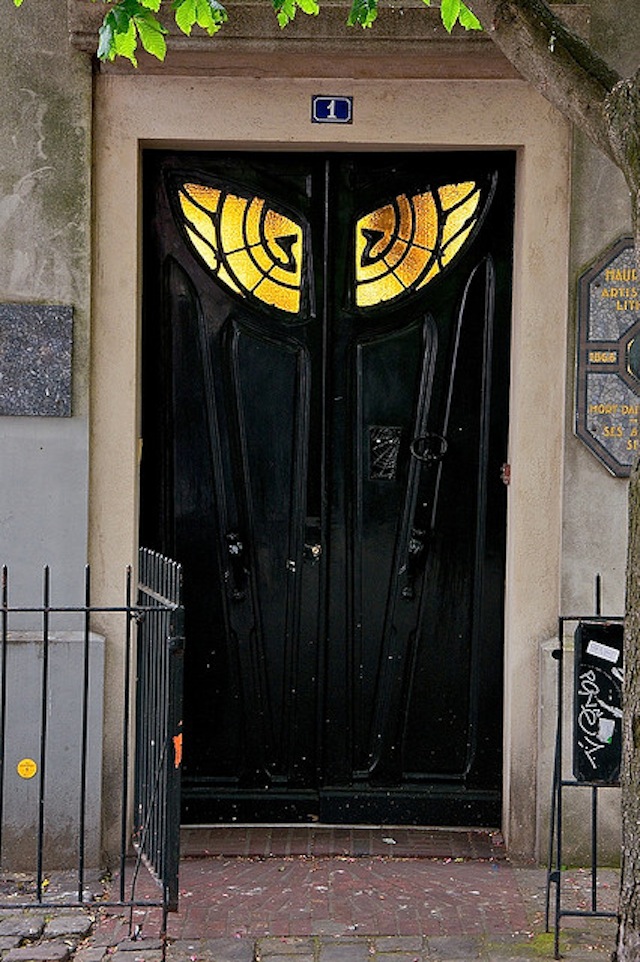Sex and Surrealism, America and France
 06.8.2011
06.8.2011
Life is surreal. Oh yes, it is.
In a state close to dream last night, I finished Henry Miller’s “Quiet Days in Clichy,” his alter-ego, Joey’s, rambunctious accounts of sex with prostitutes and a 15-year-old girl whom his equally goatish roommate, Carl, picks up wandering the streets of Paris.
Joey comes home one night to find Carl with Colette, whose virginity he has just plucked from her as casually as the god, Hades, plucked the girl, Kore, from a meadow (where she was herself plucking flowers), and took her down into the underworld with him.
The homeless girl turns out to be so sexually ravenous that Carl begs Joey to help him sate her appetite on nights when Carl is away at work in a newspaper office.
But Colette, whom the two men agree is “dumb,” is not Joey’s type. He prefers women who have something interesting to say. Besides, they could be thrown in jail for having sex with a minor. (Though sex is legal in France at the age of 15, or at least is today, the two men at first believe that the girl is 14.)
Joey begs Carl to find Colette something to wear beside the transparent Japanese shift he’s provided for her, or he may find himself raping the girl against his will.
One day, Colette disappears. The next day at noon, when Carl and Joey are both home, someone knocks on the door. It’s the police, with the girl’s parents.
The mother is so beautiful that both men wish they’d found her first. “The mother!” says Carl later. “Did you have a good look at her? She was not only beautiful, she was divine.” But the mother is mostly quiet while the police and the father, who looks like a barrister, question the two men about the girl’s missing watch.
When the mother examines a stack of books on Carl’s work table, Faust, Blake, Lawrence, Shakespeare—good literature—and hands the last volume of Proust’s great work to her husband, the man looks at Carl with new eyes. Carl then discusses the essay he’s writing on the relation between Proust’s metaphysical vision and the occult tradition, and Joey is revealed to be a famous writer. The attitude of the parents changes from accusatory to respectful.
(This was first written in New York City in 1940, and rewritten in Big Sur in 1956.)
It is fascinating to read this account of untrammeled male sexuality by an American artist, a writer, in Paris, pre-Women’s Liberation.
The only woman in Henry’s accounts of his sexual adventures who seems offended by what some might see as insensitivity to a woman’s inner life is a beautiful young Danish woman. But that’s after she and Joey and Carl and an acrobat named Corinne have a four-way sexual romp after dinner at the men’s apartment.
Those Viking babes can be so difficult!
*
The next morning, Marley and I read The New York Times over breakfast. The big news: Anthony D. Weiner (really, that’s his name?) was caught sending snapshots of parts of his body to various young women over the Internet. He had excellent pecs that must have taken many hours over many months at the gym to develop, so you can hardly blame him for wanting to show them off.
I didn’t get the opportunity to see the shot of him in his boxers, though it seems to me that he might be confusing what turns women on with men’s love of viewing body parts. But what do I know?

What knocked me out was the photo of him in bed with… Marley! Really. It was our cat, white with fawn ears, sleeping soundly beside him, so I knew immediately that Anthony, though not, perhaps, a man of good judgment, was certainly a man of good taste.
(A little aside here: Richard came home the other day from l’Alliance Francaise and told me that his French teacher had informed the class that they must not pronounce the “t” at the end of “chat,” when referring to a cat. Just as in English, in French, a pussy may refer to a cat. Or it may refer to a woman.)
Anthony, too, uses the two words interchangeably, calling this photo, “Me and the pussys.”
But then I read that not only is Anthony married, but he’s been married less than a year. His wife happens to be a personal aide to Hillary Clinton, which perhaps suggested to Anthony that if Hillary accepted Bill’s indiscretions, her aide might do the same for him.
Furthermore, Anthony seemed a likely candidate to replace Michael Bloomberg, the current mayor of NYC. And those political hopes, it seems, have now been extinguished.
I watched a video in which Anthony confessed that yes, he had sent texts of photos of his body, along with flirtatious messages to several young women on the Internet. At several points he broke down in tears.
What has happened in our world between Henry Miller’s lusty joyous relish of sex with prostitutes, 15-year-olds and indignant Danish beauties (who nevertheless, surrender to his desires), and the sexual scandals that have erupted lately in the news?
The contrast between these two New Yorkers, Henry Miller and Anthony Weiner, seems to me to be utterly surreal.
Perhaps it’s the difference between what is permitted an artist (or rather, what an artist permits himself to do) and a politician.
Perhaps it’s a difference in space, of geography, between France and the U.S.A. (The parents of the 15-year-old shifted their attitude entirely when they learned that they were addressing a famous writer. Writers are that deeply respected in France.)
Perhaps it’s a difference in time, that certain changes that occurred in the 1960s—the birth control pill, sexual freedom, books such as Simone de Beauvoir’s “The Second Sex” and Betty Friedan’s “The Feminine Mystique” and the rise of feminism—changed what women accept, and thus, what the culture condones.
However, I think another element is at play here.
There was a brief time in history in which one generation (in America, at least) was free to experiment and live out our sexual fantasies completely. There was a period after the birth control pill and before AIDS, when men and women could live as freely as they chose without fear of getting pregnant or catching a deadly disease.
Not everyone participated. But those of us who did had a rocking good time.
And listening to Anthony Weiner talk, I thought, Poor guy, he just wasn’t born at the right time. He didn’t get to live out his sexual fantasies before getting married, and this can be a big problem for highly-sexed (but repressed) people.
Artists and libertines have been sexually expressive at all times in history. But for other folks, who are socially or religiously programmed, sex may be a guilty pleasure that must be alternately repressed or furtively engaged in.
And yet, it’s the very essence of the life force. As the philosopher, Friedrich Nietzsche, said, “The degree and kind of a man's sexuality reach up into the ultimate pinnacle of his spirit.”
In Henry Miller’s writing, he often gives the impression that he’s oblivious to the effect he’s having on the women with whom he has sex, whereas Anthony Weiner’s tears of regret at hurting his wife (as well as his more political concern about disappointing his constituents) seemed to me to be genuine.
This seems like a cultural advance, a man caring (at least in retrospect) about his effect on the woman to whom he’s married.
Yet all that magnificent lusty life force that Henry had! What I love about Henry Miller, what Nietzsche himself would have admired, was the way that Miller’s sexuality and spirit were not divided. It was all of one piece, in all its lustiness as well as crudeness and lack of sensitivity.
What seems sad to me about Anthony Weiner is how divided his spirit is from his sexuality. That seems to be the inheritance of Judeo-Christianity—the body divided from the spirit. And what a sad and tortured story that creates.


